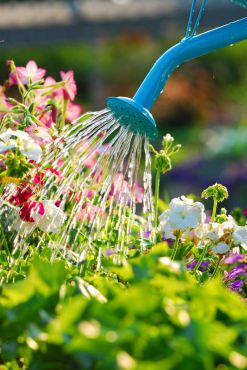 Summer Gardening Tips
Summer Gardening Tips
Summer is the perfect time to wander throughout your gardens. Take photos of the planting areas you enjoy the most. Download photos and make notes to yourself what you like the best about the various plants you’ve recorded. Make notes for future editing if you find some spots where you’d like to add or subtract plants.
Always carry your hand pruners to snip away at dead foliage and perform quick cleanup tasks. Monitor plants in containers. Remember that plants in containers need more frequent watering than plants in the ground. These plants will also need an all-purpose, liquid fertilizer at least once a month during the summer because nutrients get washed away with daily watering.
You should consider attending one (or preferably more) of the local garden shows and tours this summer. Proceeds always go to worthy causes and you can learn tons about what plants grow here well and even how to place them in the landscape. Keep in mind maintenance issues though. Ask the tour docents how much time it takes to care for each garden area.
If you want to enjoy your garden, but not be a slave to it, look for easy-care plants. You’ll want to take some time during your busy summer to hang out at the local nurseries. Notice all the landscaping they have on site. You’ll find abundant ideas to incorporate into your own garden. Ask about the classes they offer. They’re nearly always free, and when a fee is involved, it’s usually very nominal.
Volunteering is a good way to learn from and with others about plants and the environment. The WSU Extension Master Gardeners from both Kitsap and Pierce counties have local educational events and learning gardens. Visit the Extension websites (ext100.wsu.edu/pierce and county.wsu.edu/kitsap) or give them a call at 253-798-7180 (for Pierce) or 360-337-7157 (for Kitsap) to find the nearest WSU Extension learning garden near you and what it offers to the public. You can inquire about the nearest Master Gardener answer clinic just in case you have a plant problem or plant identification question for the MGs. You can also ask questions and get advice on proper plant care and plant selection from CPH (Certified Professional Horticulturists) at many of the local nurseries.
Summer Fun and Learning
Youth and Family Activities:
- Raab Park Youth Garden, South end of Caldart in Poulsbo, every Monday, June 23 through Aug. 11, 10:30 a.m. to 12:30 p.m. Every group of children must be accompanied by one or more adults. $1 donation for the make-and-take craft item
- Blueberry Park, Sylvan Way (between Wheaton and Pine) in Bremerton, email blueberry [dot] community [dot] garden [at] gmail [dot] com for the summer schedule
- Anna Smith Garden, near the intersection of Tracyton Boulevard and Fairgrounds Road, visit with the Master Gardeners on Wednesdays, 9:30 to 11:30 a.m.
- Sehmel Park in Gig Harbor, contact 253-798-7180 (the Master Gardener program) for information
Garden Tours and Shows:
- June 28-29: Gig Harbor Garden Tour. (see WSH&G article)
- June 29: Garden Conservancy Open Days Program. Visit six private gardens on Bainbridge Island, Indianola and Kingston; $5 admission, children under 12 are free. 888-842-2442
- July 11-12: Bainbridge in Bloom. (see WSH&G article)
- Aug. 2-3: Dahlia Show at Kitsap County Fairgrounds. 1-5 p.m. Saturday and noon to 4:30 p.m. Sunday
- Aug. 2: Manette Edible Gardens Tour de Coop.
Volunteering at Stewardship Sites:
- Fish Park in Poulsbo, usually third Sunday of each month, 1-4 p.m. Call 360-779-9898 to be added to the email notification list; also first and third Fridays, 9-11 a.m., email gardenmentor [at] yahoo [dot] com to be added to the list of Friday work parties
- Buck Lake Native Plant Garden, first and third Mondays of each month April through October (September is an exception), 9 a.m. to noon.
- Clear Creek Trail in Silverdale.
- Great Peninsula Conservancy, various sites.
- Stillwaters Environmental Center in Kingston.
- Kitsap County Parks and Recreation has numerous stewardship sites throughout the county; contact Lori Raymaker at Kitsap County Parks and Recreation, 360-337-5350
- Pierce County Conservation District Stream Team stewardship opportunities.
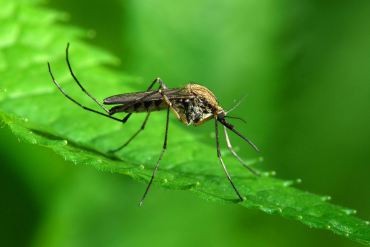 Mosquitoes
Mosquitoes
Have you ever been outside at a barbecue and watched one or two people being bitten by mosquitoes? Why don’t others get bitten? In our family, my husband is the mosquito magnet. I, happily, usually escape. “One in 10 people are highly attractive to mosquitoes,” says Jerry Butler, PhD, professor emeritus at University of Florida.
Only the female mosquitoes bite. Males have small mouth parts and exist on plant nectar, whereas the females have mouth parts and a long proboscis that they use to pierce skin. Proteins in blood enable the female to create fertile eggs.
There are more than 400 different components to examine before scientists can determine what attracts mosquitoes to only certain people or certain animals. Scientists do know that mosquitoes are attracted to carbon dioxide, prefer adults over children, and can smell their dinner from up to 50 meters away. Adults give off more carbon dioxide than children, making them more attractive to the blood-thirsty females.
Mosquitoes are also attracted to movement and lactic acid from sweat glands. When the victim is bitten, the female’s saliva contains anticoagulants that prevent the blood from clotting. Some saliva remains in the wound and the body’s immune response forms a bump on the skin. When you scratch the bump, the body’s response is to itch more and more. Avoid scratching if at all possible.
The word mosquito is Spanish for little fly. Europeans called them gnats but in North America they have been called mosquitoes since the late 1500s. Mosquitoes belong to the order Diptera (true flies). They have two wings but, unlike flies, their wings have scales.
Sources say mosquito species have been here more than 30 million years and some say even longer, 170 million years. In present day, there are 2,700 species of mosquitoes worldwide and 175 known species in the United States.
Female mosquitoes lay eggs in water, where the larvae and pupae spend their lives. Each female lives from several days to several weeks and some females can survive through the winter. The males live one to two days.
Females die after laying the eggs. Eggs develop into larvae equipped with air tubes (siphons) to breathe at the surface of the water. The larvae grow to about 0.5 to 0.75 inches and molt several times. Even though they live at the surface of the water, they can dive down deep to avoid predators. After the fourth molt, the larvae change into pupae by encasing themselves in a covering. After one to four days, they transform into adult mosquitoes, crawl out of the water and attach to a protected area until their exoskeleton hardens.
Dawn and dusk are the times to stay inside to avoid mosquitoes. In the garden and around the property, watch for any areas of standing water. Empty and clean birdbaths and children’s wading pools at least once a week. Look for containers, wheelbarrows and other garden implements or tools that could hold water; empty them regularly. Also keep gutters clean and cleared of debris and standing water.
Mosquito dunks are available at local nurseries that stock water-gardening supplies. The dunks usually come in tablet form and last for a period of time. Follow the label directions. The following plants are reputed to keep mosquitoes away: Citronella geranium, marigold variety “Lemon Gem,” lemongrass, catnip (Nepeta), Ageratum variety “Artist Purple” and lemon thyme. Check at your favorite nursery to see if it has recommendations for other plants to detract mosquitoes.
It’s believed that smoke from candles will keep mosquitoes away. Avoid wearing perfume or cologne and avoid scented shampoos, soaps and lotions. Running a fan on the deck or patio when outside often helps because mosquitoes dislike moving air.
Joseph Conlon, retired U.S. Navy entomologist and technical adviser for the American Mosquito Control Association, says DEET (diethylmetatoluamide) applied to clothing helps but needs reapplying. For children who can be harmed by higher concentrations of DEET, look for those that are 24 percent strength or less. Always carefully read the labels and follow the directions. He also cautions that some “organic” repellants use oil of clove. “Oil of clove can burn skin; use with caution,” he says. Last but not least, on the topic of mosquitoes, a 2002 study showed that mosquitoes preferred biting beer drinkers over nonimbibers.







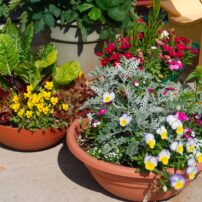

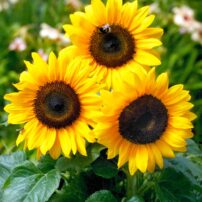
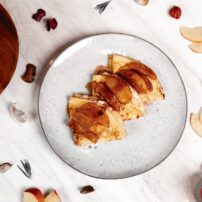









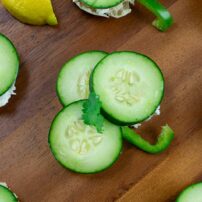

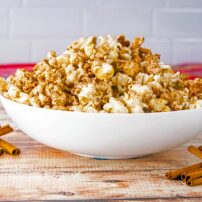










Comments